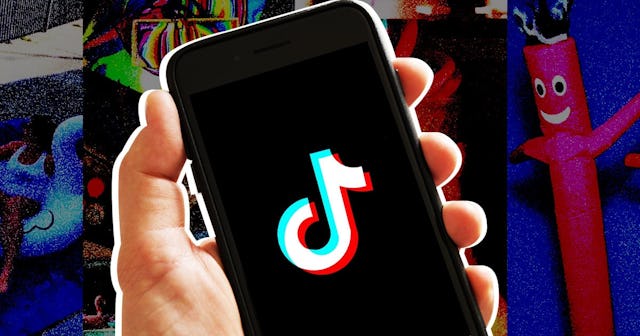What You Should Know About TikTok's 'Ugly Content' Policy

As a self-love activist on social media, I’ve had more than my fair share of moments where posts of mine have been flagged for appearing “sexually explicit.” It seems that no matter my motives or intent, the same damn thing happens anytime I decide to expose my fat body to the masses. I receive the blunt feedback from app administrators that the mere sight of me in skivvies overwhelmingly screams the word “sex.” The fact that I don’t make my body-acceptance content for the male gaze doesn’t mean much to social media moderators operating under ridiculously biased standards. It also doesn’t stop haters from fat-shaming me in the comments.
But as royally fucking frustrating as this is to experience, I understand why it happens.
If it’s not already blatantly obvious, we live in a society that glorifies white, thin bodies and also deems women as sexual objects. When you dare to exist happily and openly as a fat human being like me and document yourself doing just about anything in a swimsuit, you also immediately open yourself to criticism, objectification, ridicule, health-shaming, and even administrative policing.
And the worst societal offender of them all, according to recent allegations, is the wildly popular app TikTok.
In a disgustingly out-of-touch effort to create “optimal” viewing for new users, the platform has allegedly been suppressing content by fat, disabled, and queer creators. According to The Intercept, moderators were even told to look out for and curb the visibility of videos that displayed poverty conditions, “obvious beer bellies,” too many wrinkles, and crooked smiles.
“I’ve had TikTok take down videos if I posted in a bikini or tankini, but when you search ‘bikini’ on the app, thousands of videos pop up of thin (and mostly white) creators,” says Hannah Saada, a Texas-based body-neutrality content creator. “I was blocked from live streaming for a week for being in a swimsuit, and they’ve blocked me from posting altogether after they took two videos down consecutively.”
Ketut Subiyanto/Pexels
TikTok claims they’ve been suppressing videos like Saada’s in an effort to “curb bullying” of folks they’ve determined were more vulnerable to cyber harassment than the rest of the population. So, they are punishing the people they assume will be victims of bullying. This, of course, would already be a problematic enough motive all on its own. But apparently, bullying is the least of TikTok’s worries.
According to internal documents obtained by The Intercept in March, the musical app has allegedly been suppressing videos of marginalized people to increase their number of users. Yep, you read that right. TikTok is being accused of attempting to gain profit and popularity by quite literally placing a shit ton of people further into the margins, which is an ass backwards form of bullying all on its own. If this is true, by forcing those who live without white, non-disabled, heterosexual, and thin privilege to go unseen and unheard online, the social media platform would be directly contributing to our collective societal disconnect, bias, and oppression of these folks.
You know something’s fatphobic and discriminatory as fuck when even Lizzo has to chime in. The Grammy Award-winning singer – who boasts 8.6 million followers on the app – directly called out platform moderators who kept taking down videos of her in bathing suits, while keeping plenty of content visible of skinny, white women in bikinis.
“Tiktok keeps taking down my videos with me in my bathing suits. But allows other videos with girls in bathing suits. I wonder why?” the musician wrote in the captions for her video directed at the app.
It’s also been discovered that TikTok may be using an algorithm that seems to produce a racially biased effect called “collaborative filtering.” This basically means that if you start following a white content creator, the social media platform will usually show you more videos of white people. Obviously, doing this has the extremely likely potential to keep creators of color with smaller followings from being made visible and recommended to users. And for those who are already racially biased, seeing more of the same can promote and foster a toxic atmosphere of complacency.
Oh, and did I mention that the vast majority of TikTok users are white people? Which begs the question – if the allegations that TikTok is being blatantly racist and discriminatory in an effort to grow its app are true, what does this mean about our society at large?
“Fatphobia has its roots in racism, as what used to be a symbol of class and privilege was then linked to immorality when the same body type was seen in Black women,” Saada tells Scary Mommy. “As we fight for racial justice, we need to start peeling back other areas of oppression, as there will mostly likely be racism in its roots. “
It’s a rude awakening to realize that our social media platforms and our diet-laden, white-centered culture are inappropriately concerned about the size of our fucking pants. But I’ve got to be honest: I’d rather have my eyes open to all of this than sleepwalk through another year of letting outdated, biased, and discriminatory standards keep me from living my best life. I hope you’ll join me in educating yourself, speaking up, and standing beside Black, fat, queer, and disabled human beings who have been long overdue for positive, empowering visibility.
This article was originally published on